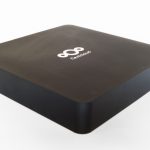How to tell if your replacement Samsung Galaxy Note7 is safe to use

Samsung recalled the Galaxy Note7 earlier this month following reports of exploding batteries, and promised to replace the affected units free of charge. To make it easy for customers to find out whether their device should be exchanged, the company has released an official IMEI lookup tool that informs them if the built-in battery is safe to use or not.
And for those who receive a replacement unit -- and for new users -- Samsung has added some visual identifiers to help folks figure out if they are looking at a revised (safe to use) Galaxy Note7. There are two major changes, over the affected units, that you should look for.
Altify brings augmented intelligence to B2B sales

The internet means that buyers are armed with more information than ever before which can make life more challenging for salespeople.
Sales transformation company Altify is looking to give sales teams the edge with the launch of its latest enterprise B2B sales platform with augmented intelligence capabilities that prompt sales professionals of the next best action to progress a sale.
The best of both worlds regarding storage and the cloud

It might shock you to hear that managing data has never been more difficult than it is today. Data is growing at the speed of light, while IT budgets are shrinking at a similar pace. All of this growth and change is forcing administrators to find more relevant ways to successfully manage and store data. This is no easy task, as there are many regulatory constraints with respect to data retention, and the business value of the data needs to be considered as well.
Those within the IT world likely remember (with fondness) the hierarchical storage management systems (HSM), which have traditionally played a key role in the information lifecycle management (ILM). Though this was once a reliable and effective way to manage company data, gone are the days when businesses can put full confidence in such a method. The truth of the matter is that things have become much more complicated.
Google and Apple show that tech companies' blase attitude to tax cannot continue

Technology firms, like bankers, are starting to earn a bad name for themselves. The practice of funneling profits from different branches of a company through countries that have favorable rates of tax is nothing new -- far from it -- but it's becoming far more prevalent. Apple was recently asked to pay back $14.5 billion in unpaid tax in Europe, and this is not an isolated incident.
Small businesses understandably feel that they are getting a raw deal when the big players have the clout and resources to play the system to their advantage. But it doesn't always work out. In addition to the $14.5 billion in Ireland, Apple has just paid back $118 million in Japan for 'under-reporting income' and Google is also facing investigation in Indonesia over possible unpaid taxes.
Boost speeds on busy PCs with Project Mercury

Modern CPUs are powerful devices which can run most applications without difficulty, but run enough processes at the same time and your performance will soon fall away.
Project Mercury (64-bit version) is a freeware tool which automatically optimizes process priorities and RAM usage to ensure your active application always has the maximum system resources.
How to plan for and recover from IT emergencies

Bugs in the software, mistakes in configuration files, even the infamous "fat finger" -- all are responsible for service outages at cloud-based services, data centers, enterprise networks, and any other IT installation, large or small.
There are just too many things that can go wrong. Even if an organization takes care of everything humanly possible, there are still the monkeys. That's a lesson the folks at KenGen, Kenya's electric company, have learned the hard way.
Windows Safe Mode attack could put your passwords at risk

Because it allows only the essential elements of the Windows operating system to run, Safe Mode is a useful tool for diagnosing and fixing problems. But according to researchers at CyberArk Labs it could also be exposing you to risk.
Safe Mode stops a lot of third-party software from running at startup and that can include many security solutions. Attackers who have gained remote access to a machine may therefore be able to reboot it into Safe Mode to launch attacks.
Easily switch between 20+ DNS servers with Change DNS Helper

Switching your DNS servers can improve web performance, enhance security and help you reach some sites you can’t normally access.
It’s awkward to do this manually, but Change DNS Helper is a free tool which makes the process much easier.
ACDSee Ultimate 10 adds Smart Brushes and GPU support

ACD Systems has unveiled ACDSee Ultimate 10 ($149.99), the latest edition of its powerful image editor.
A new Smart Brush enable users to brush on image adjustments simply by painting over the image area.
Microsoft Surface and Huawei MateBook are bullying Apple iPad Pro in Windows 10 video

There is no place for bullying in the world. Schools around the country are teaching this important lesson. When one person is mean to another, that is very bad. When two people join forces to bully someone, it can be even worse -- it is hard to stand up for yourself when you are outnumbered.
When Microsoft ran mean-spirited advertisements against Apple's MacBook, my colleague Mark Wilson took umbrage, calling the ads 'childish and imbecilic'. Today, in an all-new ad, Huawei MateBook is joining the Surface Pro in the Apple-bashing. The personified versions of two Windows 10 tablets come across as bullies, belittling Apple's iPad Pro.
Ads drive most Internet traffic in Europe

With all the buzz and fuss over ad blockers and how they hurt the internet we know today, it's interesting to see just how much traffic these ads actually drive. As it turns out, more than you'd expect. According to a new report by Adobe Digital Insights, more than two thirds (68 percent) of all European traffic is driven by ads. General traffic is also growing. In Europe, more than half (54 percent) of sites grew their traffic in the last three years.
Also, mobile advertising is catching up. Personal advertising, an ads strategy which seems to be working quite nicely, is not as popular in Europe as it is in the States, the same report says. Personalized ads, such as direct emails or social advertising, accounted for 36 percent of new traffic for growing U.S. websites. In Europe, that percentage is at eight.
Time to learn Pig Latin, your devices are listening

While it’s convenient to turn lights on, lock doors, check humidity levels and monitor energy use in your home with your smartphone, those conveniences come at a cost; even something as seemingly harmless as monitoring calorie burn with a connected device can lead to a breach. Billion dollar companies are having a hard time shielding themselves against hackers, insider threats and data leakage, let alone a single device in your home.
When you register devices and tie them to your email account and address you are opening that information up to be invaded. Additionally, fitness trackers are revealing whether you have met your goals, coffee pots are recording how quickly you go through your favorite brew and thermostats are recording what time of day you are home. All of this information is valuable to companies because it can be sold to other businesses that can customize ads to fit the data you are inadvertently feeding them. Even the FTC has expressed concerns over what the Internet of Things will mean for the future of privacy and security.
IBM Cloud adds mobile security service

When it comes to corporate IT security, one of the biggest pain points is the mobile device. With almost every employee having one, and many bringing their own, the cyber-attack surface increases dramatically, putting corporate data at huge amounts of risk. Now, IBM is stepping into the game with a service of its own, which aims to protects mobile devices, via IBM Cloud.
The mobile-security-as-a-service, called IBM MaaS360, aims to help IBM’s clients address local data protection standards. It is currently in operation in the US, Germany and Singapore, with France and India already in the works. They will be followed by an "additional eight countries" planned for the next two years. IBM didn’t go into further detail, but we’re hoping the UK will be among them.
Canonical and Western Digital launch Ubuntu Linux 'Nextcloud Box' powered by Raspberry Pi

Cloud storage is amazingly convenient. Unfortunately, the best part of the cloud can also be the worst. You see, having your files stored on someone else's severs and accessing them over the internet opens you to focused hacking, and potentially, incompetence by the cloud storage company too. As a way to have the best of both worlds, some folks will set up net-connected local storage so they can manage their own 'cloud'.
Today, Canonical and Western Digital (WDLabs) unveil an Ubuntu Core Linux-based cloud storage and 'Internet of Things' device called 'Nextcloud Box'. The box leverages the open source Nextcloud service and can be powered by a Raspberry Pi 2, Raspberry Pi 3, or oDroid C2. Will it be easier to use and manage than closed source solutions?
Public cloud services market to reach $208.6 billion in 2016

Both businesses and consumers have embraced the cloud and Gartner projects that the worldwide public cloud services market will grow by 17.2 percent by the end of this year.
In 2015, the public cloud services market was worth $178 billion. Gartner's projection that it will grow by 17.2 percent in 2016 will bring that number up to $208.6 billion, which is a testament to the way in which the cloud has matured and won over businesses and consumers.
Most Commented Stories
© 1998-2024 BetaNews, Inc. All Rights Reserved. Privacy Policy - Cookie Policy.




